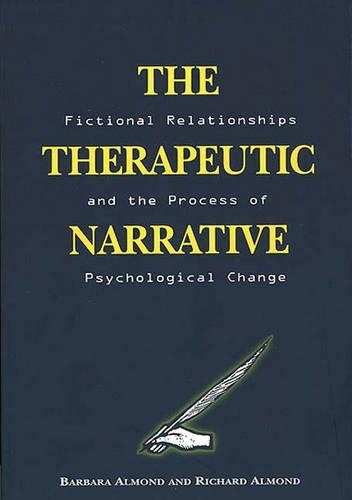
The Therapeutic Narrative: Fictional Relationships and the Process of Psychological Change
(Paperback)
Available Formats
Publishing Details
The Therapeutic Narrative: Fictional Relationships and the Process of Psychological Change
By (Author) Barbara Almond
By (author) Richard Almond
Bloomsbury Publishing PLC
Praeger Publishers Inc
24th September 1996
United States
Classifications
Tertiary Education
Non Fiction
Literary studies: fiction, novelists and prose writers
Psychoanalytical and Freudian psychology
809.3
Physical Properties
Paperback
224
Width 156mm, Height 235mm
340g
Description
How do people change Longing for personal growth and transformation is a central theme of our times. Psychotherapy seeks to change the dynamics behind people's symptoms and conflicts. Writers, too, are fascinated by this theme, and have explored it frequently in their stories and characters. In this book, Barbara and Richard Almond, both psychoanalysts, explore a variety of novels that describe internal, personal change. They discover that there are fascinating parallels between the processes that lead to change in literary characters and the mechanisms observed in psychotherapeutic change. From Jane Austen's "Pride and Prejudice" to Frances Hodgson Burnett's "The Secret Garden" to Anne Tyler's "The Accidental Tourist", the plot begins with a character struggling with personality limitations. A new person appears in the story; a bond is formed with the central character. In the relationship that follows, the two struggle. Confrontational and loving interactions lead the protagonist through a process of gradual change. The authors delineate a therapeutic narrative: the "plot" of change in both psychotherapy and literature. By comparing a variety of novels, they elaborate the elements of this therapeutic narrative and draw provocative conclusions about the mechanisms of psychotherapy and psychoanalysis.
Reviews
"In this lucid and engaging study, Barbara and Richard Almond argue that precise, authentic meanings may be found in the claim, "This is a book that changed my life." Drawing on a very wide range of literary plots and many years of clinical practice, the authors demonstrate the ways that certain stories provide models of the dynamic of healing interaction that is the goal of all psychotherapies. Never losing sight of crucial distinctions between art and life, the authors make a persuasive case for the relevance of bringing insights drawn from clinical work into the act of reading fiction, for the enrichment of both."-Diane Wood Middlebrook, Professor of English Stanford University
"In The Therapeutic Narrative, two eminent psychiatrists examine well-known fictional characters and relationships and provide the reader with an entirely fresh and highly perceptive understanding of familiar characters who dwell in the works of Jane Austen, Charlotte Bronte, George Eliot, and many others."- Irvin Yalom, M.D. Emeritus Professor of Psychiatry, Stanford University
"The authors present a novel way of conceptualizing a genre of classical 19th-century masterpiece novels and some of their modern companion novels as "therapeutic narratives" depicting healing interactions between major protagonists in ways analogous to therapeutic processes in real-life psychoanalytic treatments. A fascinating, psychoanalytically-informed perspective upon this species of novel that provides illumination for the literary and the psychoanalytic scholar alike."- Robert S. Wallerstein, M.D. Past-President, American Psychoanalytic Association and International Psycho-Analytical Association
The authors propose that novels often present 'therapeutic narratives' comparable to the psychoanalytic process that leads to the healing of psychic distress....undergraduates might find a model here of how to do a psychoanalytic reading ot classic English novels, for the book is clearly written and presupposes no previous encounter with psychoanlytical concepts.-Choice
"The authors propose that novels often present 'therapeutic narratives' comparable to the psychoanalytic process that leads to the healing of psychic distress....undergraduates might find a model here of how to do a psychoanalytic reading ot classic English novels, for the book is clearly written and presupposes no previous encounter with psychoanlytical concepts."-Choice
Author Bio
BARBARA ALMOND is a Clinical Assistant Professor in the Department of Psychiatry at Stanford University Medical Center. She received her M.D. from Yale University and did her psychiatric training at Georgetown and Stanford. Dr. Almond is an advanced candidate at the San Francisco Psychoanalytic Institute and has a private practice in Palo Alto, CA. RICHARD ALMOND is a member of the faculty at the San Francisco Psychoanalytic Institute and is Clincial Professor of Psychiatry at the Stanford University School of Medicine. Dr. Almond received his M.D. from Yale University and did his psychiatric training at Yale. He is the author of The Healing Community (1974) and is currently in private practice in Palo Alto, CA.
